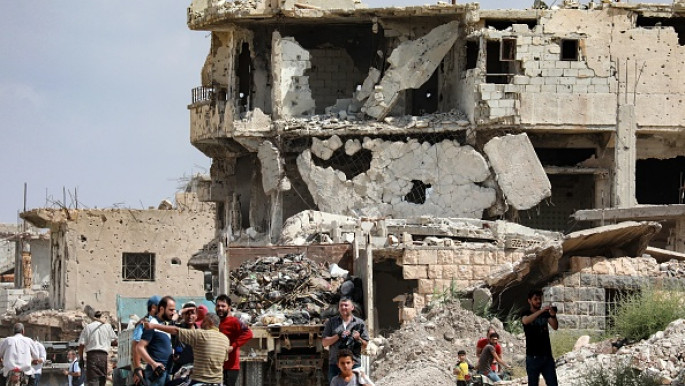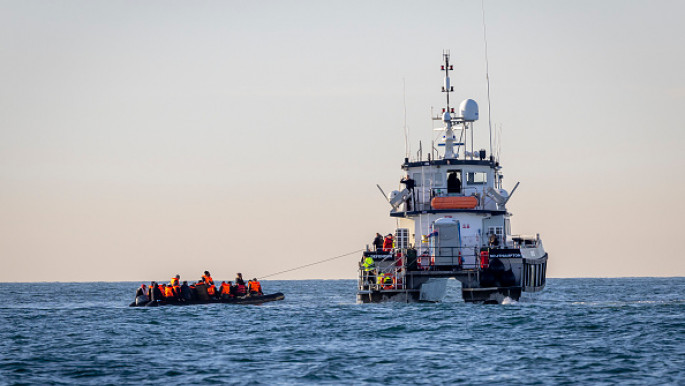
'Invading Britain': This Syrian refugee's harrowing story is a reminder of the nightmare reality behind irregular migration

On 31 October, UK Home Secretary Suella Braverman, herself of immigrant origin, dubbed refugees reaching the UK "an invasion", ignoring that the majority arriving on Britain's shores via small boats are fleeing devastating wars, terror, imprisonment, torture and death.
Public concern around immigration – which led a majority of British voters to vote for Brexit six years ago – has waned in the last two years, according to polling, though 40,000 immigrants have arrived this year on the boats. However, the Manston centre scandal in Kent, where severe overcrowding led to an outbreak of infectious diseases, has re-opened this discussion.
Al-Araby Al-Jadeed, The New Arab's Arabic-language sister edition, met with "M.N." (not his real name to protect his identity), a Syrian refugee who arrived in Britain last year after a six-month journey by land, sea, and sky.
M.N. starts by explaining that twice as many smugglers are required inside Syria itself as for the rest of the journey, from Turkey onwards; Syria today is a divided country, crisscrossed by a thousand checkpoints and factions. To escape, you need a "strong heart, a phone, and thousands of dollars," he says. But equally important are your identity, and where you're from.
"M.N.'s father was arrested in November 2013, accused of cooperating with "terrorists". He was summoned to one of Deraa's military's security branches and never returned"
Every Syrian city associated with the revolution is on one side geographically, except Deraa, which lies on the other side, he says, and which the regime considers the catalyst for the turning point which threatened its very existence.
M.N. was 14 when the uprising broke out, and checkpoints suddenly sprung up across the city, marring familiar streets he'd known since childhood. He left school as "Deraa's schools became unsafe: classrooms were stormed by the army and students were terrorised, imprisoned – so were teachers."
M.N.'s father was arrested in November 2013, accused of cooperating with "terrorists". He was summoned to one of Deraa's military's security branches and never returned: "We still know nothing," says M.N.
Upon his father's arrest, M.N.'s childhood ended. He and his brothers now had to look after the family; his father was gone. The only news they ever heard, one year later, was that he was in Sednaya Prison and that his leg had been amputated after torture. That was the first time M.N. realised that news of a death is kinder than hearing someone you love has been tortured.
The losses pile up
A year later, his eldest brother was shot accidentally when gunfire erupted near a checkpoint he was crossing. He was rushed to hospital, but deteriorated fast, entering a coma.
The doctors said he needed a CT scan to show where the internal bleeding was, but none of Deraa's hospitals had a functioning scanner at that time. They decided to cross into Jordan. But that day, the border guards wouldn't let them pass. "We watched him dying in front of us and couldn't save him." He died that night.
|
|
One month later, his middle brother (two years older than M.N.) was arrested from his university lodgings in Damascus. The stated accusation is always "cooperating with terrorists and fighting for the Free Syrian Army," says M.N., but the unstated accusation is: "You're from Deraa"; where the revolution began.
He says they began searching desperately for his brother as if he was a possessed person. His mother couldn't bear another loss; she still hadn't absorbed her husband's disappearance or her eldest son's death. They eventually learned that his brother was in Sednaya prison. His mother visited, taking clothes and food for him, but security confiscated everything before she could enter the compound.
She waited in a narrow corridor behind a mesh barrier, to catch a glimpse of her beloved son. M.N. says if she hadn't been his mother she wouldn’t have recognised him. The hunger, torture and abuse had reduced him to a skeleton. The jailers used all kinds of torture at Sednaya, from the "al Shabah" method to the "Tyre", to electric shocks, says M.N.
"His mother's anguish was what pushed M.N. to flee Syria: "Leaving her alone was kinder than adding to her pain – the possibility that she could lose me, too"
His mother stood behind the mesh overlooking a corridor where a guard was monitoring the visits. Then there was a second mesh fence behind which crowded detainees who had come to meet their relatives. M.N. remarks that not only could his mother not hug his brother; even senses of smell, of any closeness were denied – it could hardly be called a visit. The visit was three minutes long. His mother went a second time, though visits caused extra torture for detainees, who were excessively beaten before and after every visit.
On the third visit, the guards stated blandly: "Your son is no longer here," without elaborating. His mother broke down says M.N.; she was in constant agony over the possible fates her son might have endured, from being tortured to death to still being alive but imprisoned and unable to see her, suffering continued abuse.
His mother's anguish was what pushed M.N. to flee Syria: "Leaving her alone was kinder than adding to her pain – the possibility that she could lose me, too."
M.N. believes the regime, whose sense of its own "invincibility" was shaken by the revolution, wants the Syrian people to suffer deeply as punishment.
Attempting escape
M.N. left with a smuggler to Aleppo, then Idlib, where members of the Hamza Brigade (a militant opposition group) were waiting for them. For five hours, the group trudged through a deep valley. Suddenly their path was blocked by armed men and gunfire broke out. M.N. didn't know who the militants were. Some of his companions were killed; the survivors were arrested and taken to a branch of Military Security in Aleppo.
There they separated the women and children from the men. But M.N. was to receive extra special treatment because of his hometown. Here, M.N. started referring to events with infinite precision, pinpointing the days, hours and minutes. After eight days of beatings and verbal abuse, he was transferred to Syrian Military Intelligence Branch 227 in Damascus, where he was beaten until he fainted.
He faced multiple accusations, none of them clear. He spent 20 days there, an officer attempting to extract "confessions" about things he hadn’t done – he refused. The officer made him lie on the ground, stamped repeatedly on his head and struck him with a green water hose which the guards nicknamed "Lakhdar Brahimi". He was then moved to the Palestine Branch where he spent the first 50 days without interrogation, sleeping alongside 92 others, sometimes many more, in a square 4x4 metre room.
On day 51 he was taken for interrogation. They sat him on the ground with his head to the wall, and everyone who entered or exited the room would kick him in the head. They stretched him out on the floor and the officer started walking over him and stamping on his head.
The questions were the same as before. They hung him from his wrists (Al Shabah) – the marks where the handcuffs gouged into his skin are still visible. They electrocuted him and rained derogatory insults on his mother, sister, family and city.
|
|
In Palestine Branch, M.N. met a 67-year-old man from Aleppo who had been there five years, five months and ten days. One morning the man asked him to rub his chest because he wasn't feeling well. Suddenly he fainted, struggling to breathe.
M.N. says he banged on the cell door with the others, shouting that a man was dying, but the guards just shouted insults back, threatening severe punishment if they banged the door again before the man died.
"An hour after he died, we told them. They gave us a carpet to roll him in and dump him in the corridor." M.N. says he wished then that he'd been "born a dog" to have been spared what he experienced in that place.
"Invading" Britain
After 65 days, he was interrogated again. The officer fastened his hands and feet to a wooden board with movable parts and started to twist the board, trying to break his back. "He couldn't break my back," M.N. says shortly.
On day 103, he was transferred to the Qaboun district, and from there to the Saasaa branch in Quneitra where he spent five days before his family succeeded in securing his release, having paid huge sums on extensive mediation.
The fate of the thousands of missing or forcibly disappeared "is one of the Syrian war's greatest tragedies,"
— ابتسام عازم (@IbtisamAzem) November 30, 2022
The fight to establish a #UN mechanism for #Syria's missing https://t.co/sLReJjivSr via @the_newarab
One week after getting out, M.N. decided to try again. This time, the smuggler chose another route, from Aleppo to Afrin to Azaz to Kilis then to Istanbul where he spent five months repeatedly attempting to cross.
Though he and others were attacked repeatedly by the Greek and Turkish coastguard, he finally entered Greece and was able to cross into Serbia, then Hungary, Germany, Austria and France, before finally managing to "invade" Britain one year ago.
This is an edited translation from our Arabic edition. To read the original article click here.
Translated by Rose Chacko.




